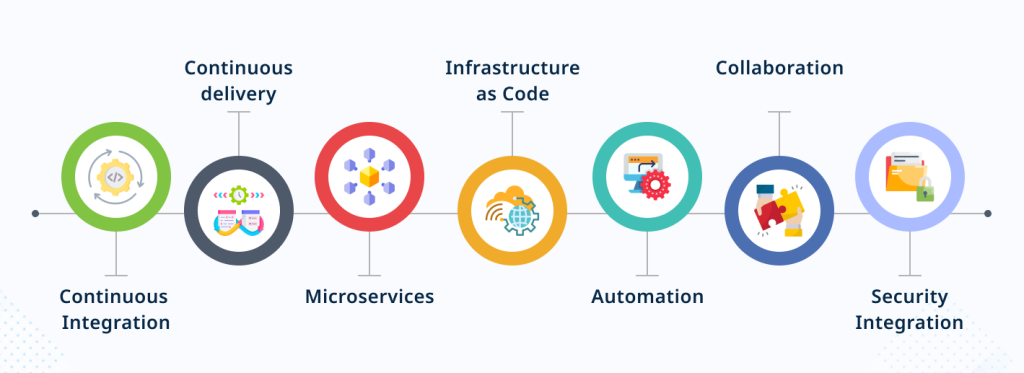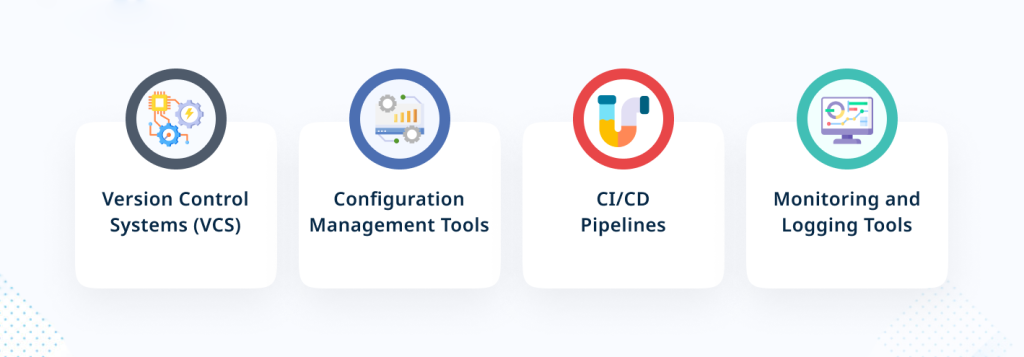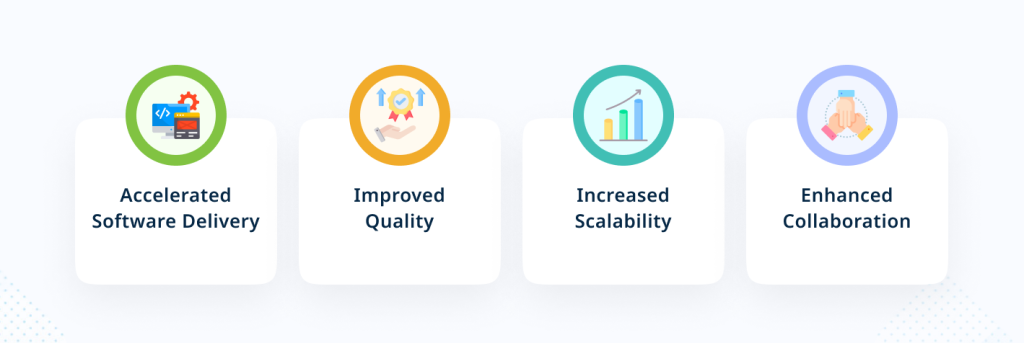Introduction
In today’s software landscape, speed and efficiency are king. DevOps is a philosophy that aims to bridge the gap between development (Dev) and operations (Ops) teams, fostering collaboration and streamlining the entire software development lifecycle. To ensure the timely delivery of the latest updates, optimizing software development and deployment processes is essential.
Traditionally, these teams functioned in silos, leading to bottlenecks and slow release cycles. DevOps breaks down these barriers by promoting a culture of shared responsibility and continuous improvement.
At its core, DevOps is about automating processes and adopting a continuous delivery model. This means frequent code changes are integrated, tested, and deployed, allowing for faster time-to-market and quicker response to customer needs.
What is DevOps?
DevOps is about collaboration, automation, and continuous improvement, not just a collection of tools.
It breaks down the traditional storehouse between Dev and Ops, fostering a shared responsibility for delivering high-quality software faster and more reliably.
Key Practices of DevOps

- Continuous Integration (CI): Developers frequently (often multiple times a day) integrate their code changes into a shared repository. Automated builds and tests are triggered on each integration, catching bugs early and preventing integration issues.
- Continuous Delivery (CD): Building upon CI, CD automates the process of delivering software to production environments. This ensures a consistent and reliable deployment process, allowing for frequent releases with minimal risk.
- Microservices: DevOps best practices include Microservices as another pillar. Microservices, or microservices architecture, is an architectural approach that arranges an application as a collection of small autonomous services, each executing in its process and communicating with others through lightweight means, typically an HTTP-based API. Each service performs a single business function as part of a microservices architecture. The application’s services can be built, deployed, scaled, and even decommissioned independently of each other. Moreover, it allows different teams to control different services, which can be created in different programming languages.
- Infrastructure as Code (IaC): DevOps treats infrastructure as code, allowing for its provisioning and management through scripts. This approach enhances consistency, minimizes manual errors, and facilitates easy scalability of infrastructure.
- Automation: Repetitive tasks throughout the development lifecycle are automated, freeing up valuable developer time for innovation and problem-solving. This includes automated testing, deployment pipelines, and infrastructure management.
- Collaboration: DevOps fosters a culture of open communication and collaboration between Dev, Ops, and other stakeholders. This allows for better problem-solving, faster issue resolution, and a shared understanding of the software development process.
- Security Integration: Incorporating security into the DevOps pipeline, often known as DevSecOps, is the final but most important piece of the DevOps puzzle. DevOps workflows should include security practices rather than treating them as separate concerns. Security evaluations and vulnerability assessments were frequently performed after the development lifecycle in previous development models. This delay may result in security concerns being discovered late in the game, necessitating costly and time-consuming repairs. DevSecOps, on the other hand, tries to move security left, exactly like testing, incorporating it early and frequently throughout the development cycle.
Benefits of DevOps

- Accelerated Software Delivery: DevOps enables faster and more frequent software releases by automating tasks and streamlining processes. This allows businesses to adapt quickly to changing market demands and deliver value to users sooner.
- Improved Quality: This emphasis on continuous integration, testing, and feedback loops leads to higher-quality software with fewer bugs.
- Increased Scalability: IaC and automation enable infrastructure to be easily scaled up or down as needed, allowing businesses to adapt to changing workloads.
- Enhanced Collaboration: DevOps creates a culture of collaboration and communication across teams by breaking down silos.
DevOps and Agile Methodologies
DevOps complements Agile methodologies perfectly. Both approaches emphasize collaboration, iterative development, and rapid feedback loops. DevOps provides the tools and practices to automate and streamline the delivery process within an Agile framework.
Essential DevOps Tools

- Version Control Systems (VCS): Tools like Git enable developers to track code changes, collaborate effectively, and revert to previous versions if necessary.
- Configuration Management Tools: These tools manage infrastructure configurations, ensuring consistency and repeatability across environments.
- Continuous Integration/Continuous Delivery (CI/CD) Pipelines: These pipelines automate the build, test, and deployment process, enabling smooth and reliable software delivery.
- Monitoring and Logging Tools: Tools that monitor application performance and system health provide valuable insights for troubleshooting and optimization.
Considering a DevOps Transformation
The transition to DevOps is not simply about adopting a set of tools. It requires a cultural shift and a commitment from leadership. Here are some steps to consider:
- Start with small, achievable goals and gradually introduce DevOps practices into your existing workflow.
- Invest in training to equip your teams with the necessary skills and knowledge.
- Promote collaboration and communication between Dev, Ops, and other stakeholders.
- Measure your progress and continuously iterate on your DevOps practices.
By embracing DevOps principles, organizations can achieve a significant competitive advantage by delivering high-quality software faster and more reliably. DevOps enables businesses to innovate and improve continuously, thriving in the constantly evolving world of technology.
Conclusion
The Future of Software Delivery is DevOps
In today’s dynamic software landscape, DevOps is no longer a fad it’s a necessity. By fostering collaboration, automation, and continuous feedback, DevOps empowers organizations to deliver high-quality software faster and more reliably. As businesses strive for agility and innovation, embracing DevOps principles will be a key differentiator in the race toward success.
This deep dive has explored DevOps’s core principles, benefits, and implementation strategies. While the journey might require a cultural shift and initial investment, the long-term gains in terms of efficiency, quality, and developer satisfaction make DevOps a compelling proposition for any software development organization.
How Aipxperts Can Be Your DevOps Solution
Aipxperts, with its expertise in DevOps tools and methodologies, can be your one-stop shop for implementing a successful DevOps strategy.
We can help you:
- Assess your current development process and identify areas for improvement.
- Identify your specific needs and design a customized DevOps strategy.
- Implement DevOps tools and practices to automate your software delivery pipeline.
- Provide ongoing support and guidance to help you achieve your DevOps goals.
By embracing DevOps principles and partnering with a trusted solution provider like Aipxperts, you can unlock the full potential of your software development process, delivering high-quality software faster and more efficiently.
At Aipxperts, we understand the importance of leveraging these models to deliver high-quality software efficiently. We’re not just a development team; we’re your dedicated partner in crafting successful software solutions that meet your needs. Embracing prototype models with us by your side ensures a smoother journey toward software excellence.
Optimizing Software Development and Deployment through DevOps.| Hire experienced DevOps from Aipxperts. Contact us for project estimates and enjoy a 15-day risk-free trial period.











